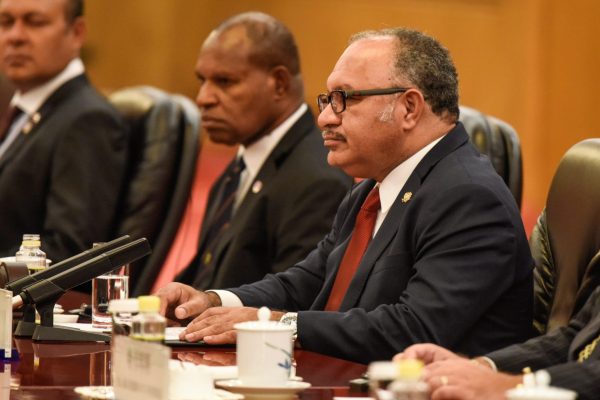For the last two decades, PNG has followed a policy of tariff reductions. As part of its negotiations with the World Bank and International Monetary Fund, the country introduced a Tariff Reduction Program (TRP) in 1999, which set out tariff reductions to 2006. Despite some opposition, the TRP was upheld by a 2003 review and the 1999 plans were broadly implemented. Another review in 2007 resulted in a further round of reductions to 2018.
It is important to note that most tariff lines (75 per cent) in PNG are in fact zero, with no tariffs on imports of most goods for which there is no domestic production. For those goods that are subject to tariffs, there have been three types of tariffs since 1999 — ‘intermediate’, ‘protective’ and ‘prohibitive’. All have fallen significantly over time: the unweighted average of the three tariff categories fell from 42 per cent in 1999 to 18 per cent in 2015.
With a few exceptions, PNG’s tariff reductions over the last two decades were implemented as planned. But in August 2017, the TRP was suspended. And in legislation that accompanied the 2018 budget in November 2017, about 250 tariffs lines were increased while over 600 tariff reductions were abandoned.
On average, the tariff increases were moderate (about 7 per cent) but there were some substantial increases. In particular, a 25 per cent tariff on milk — which was previously duty-free — was introduced to support the new Ilimo Dairy Farm.
Examples of protectionist measures from PNG’s past are instructive. Ramu Sugar was initially partly government owned and has received generous protection since its inception in the 1980s. PNG Halla Cement was also partially government owned and received support in the 1990s. Neither business has lived up to expectations.
Ramu Sugar provided no dividend in its first 10 years of operation. The government stake in Ramu Sugar was eventually sold to New Britain Palm Oil, which converted 2500 hectares of the land from cane sugar to palm oil. Despite now being over three decades old — hardly part of an infant industry — it is said that domestic sugar production still wouldn’t be able to survive without large tariffs that now reach 30 per cent on the import of sugar.
After seven years of poor performance, the PNG government sold its 50 per cent share in PNG Halla Cement to Japanese company Taiheyo. The privatised company is said to be profitable now, though it still benefits from a 10 per cent tariff and has a monopoly on the cement market in PNG. It has also had difficulty meeting demand in the past.
2018 is the year that PNG is hosting the annual meeting of APEC, an organisation created to promote free trade. While PNG is not the only APEC economy that is turning protectionist, it is ironic that, having reduced tariffs for almost 20 years, PNG baulked at the final tariff reductions due in this APEC year and instead increased tariffs.
It is certainly a departure from PNG’s past economic policies, which emphasised outward orientation. Administrative costs will be higher for a less uniform system: the new changes have introduced new tariff rates of 12.5 per cent, 20 per cent and 25 per cent, in addition to the older ones of 10 per cent, 15 per cent and 30 per cent. Now that the TRP has been abandoned, businesses will lobby for further tariff increases.
On the positive side, the tariff increases are mainly moderate and may be justified given exchange rate overvaluation. But they will still harm exporters. A more direct and efficient method to help domestic producers of both imports and exports would be to correct the overvaluation by devaluing the PNG kina.
Rohan Fox is a Research Officer at the Development Policy Centre in the Australian National University (ANU) and holds a Masters in International and Development Economics from the ANU. He was formerly a lecturer in economics at the University of Papua New Guinea.
Stephen Howes is Director of the Development Policy Centre and Professor of Economics in the Crawford School of Public Policy, ANU.
Maholopa Laveil is an economics graduate from the University of Papua New Guinea and is in his second year of a Masters in International and Development Economics at the ANU.
A version of this article was previously published here on Devpolicy Blog.


A key component of the TRP, was for tariffs to be reduced as regulatory impediments reduced and infrastructure improved. History showed that when tariffs were reduced, the cost of doing business sky rocketed, and almost nil investment came into PNG without a raft of special exemptions and exclusions. A number of importers have made significant earnings, created very limited employment, even less social or economic development contributions and despite large volumes traded, little revenue or pass through. it should also be noted that under-valuing and transfer pricing grew at an alarming rate. As tariffs reduced prices escalated and remained predatory around locally produced items. There were no visible benefits for local consumers.
The cessation of the TRP, has seen significant investment in local manufacturing, without calls for special exemptions, prices have not increased and whilst still making higher margins than manufacturers the importers, whom passed on very little are the only ones making a little less.
Surely not a bad thing for Govt to support those that are creating jobs, investing, paying taxes and following the rules of the land.